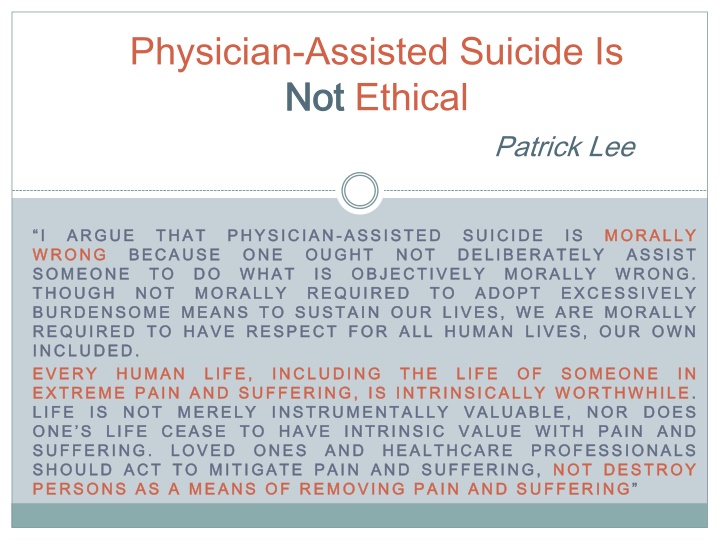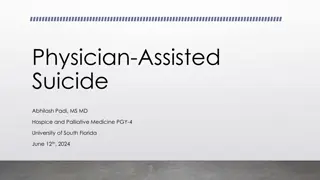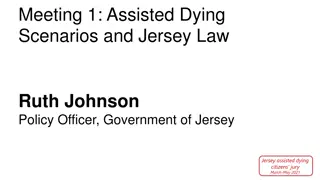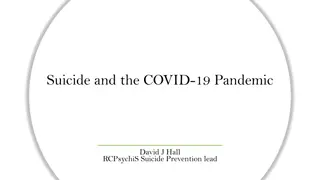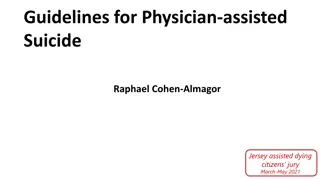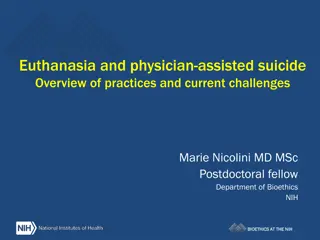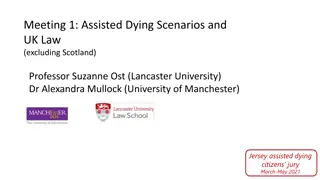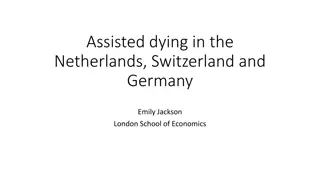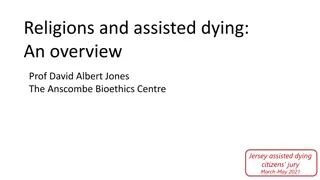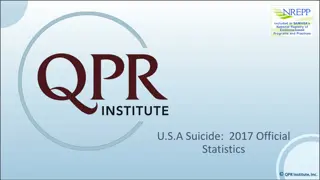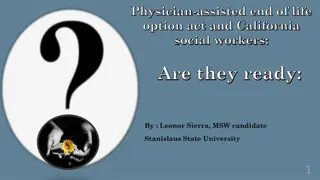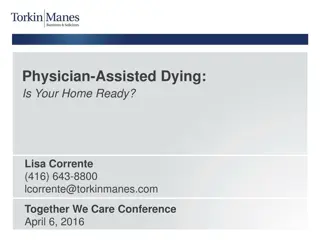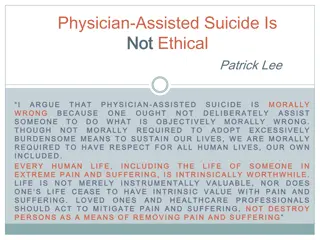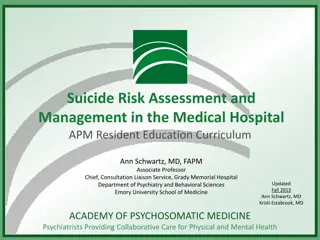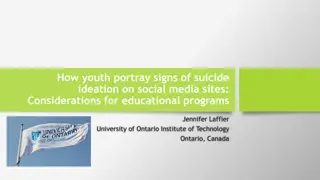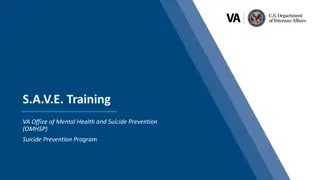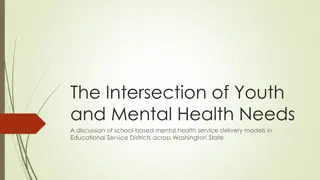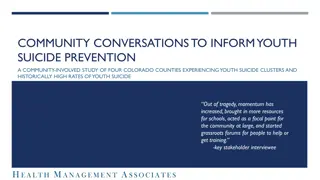Ethical Considerations on Physician-Assisted Suicide and End-of-Life Dilemmas
Exploring ethical perspectives on physician-assisted suicide and complex end-of-life scenarios through case studies and philosophical viewpoints. Analysis includes moral, legal, and consequentialist arguments regarding the value of human life and the role of healthcare professionals in such difficult decisions.
Download Presentation

Please find below an Image/Link to download the presentation.
The content on the website is provided AS IS for your information and personal use only. It may not be sold, licensed, or shared on other websites without obtaining consent from the author.If you encounter any issues during the download, it is possible that the publisher has removed the file from their server.
You are allowed to download the files provided on this website for personal or commercial use, subject to the condition that they are used lawfully. All files are the property of their respective owners.
The content on the website is provided AS IS for your information and personal use only. It may not be sold, licensed, or shared on other websites without obtaining consent from the author.
E N D
Presentation Transcript
Physician-Assisted Suicide Is Not Not Ethical Patrick Lee I I WRONG WRONG SOMEONE SOMEONE THOUGH THOUGH BURDENSOME BURDENSOME MEANS REQUIRED REQUIRED TO INCLUDED INCLUDED. . EVERY EVERY HUMAN HUMAN EXTREME EXTREME PAIN PAIN AND LIFE LIFE IS IS NOT NOT ONE S ONE S LIFE LIFE SUFFERING SUFFERING. . SHOULD SHOULD ACT ACT TO PERSONS PERSONS AS AS A A MEANS ARGUE ARGUE PHYSICIAN PHYSICIAN- -ASSISTED ONE ONE OUGHT OUGHT WHAT WHAT IS IS MORALLY MORALLY REQUIRED REQUIRED MEANS TO TO SUSTAIN SUSTAIN OUR TO HAVE HAVE RESPECT RESPECT FOR THAT THAT ASSISTED SUICIDE SUICIDE DELIBERATELY DELIBERATELY MORALLY MORALLY ADOPT ADOPT OUR LIVES, LIVES, WE FOR ALL ALL HUMAN HUMAN LIVES, MORALLY MORALLY ASSIST ASSIST WRONG WRONG. . EXCESSIVELY EXCESSIVELY WE ARE ARE MORALLY MORALLY LIVES, OUR OUR OWN IS IS BECAUSE BECAUSE TO TO NOT NOT NOT NOT DO DO OBJECTIVELY OBJECTIVELY TO TO OWN LIFE, LIFE, AND SUFFERING, SUFFERING, IS MERELY MERELY INSTRUMENTALLY INSTRUMENTALLY CEASE CEASE TO TO HAVE HAVE LOVED LOVED ONES ONES TO MITIGATE MITIGATE PAIN MEANS OF OF REMOVING REMOVING PAIN INCLUDING INCLUDING THE THE INTRINSICALLY WORTHWHILE VALUABLE, VALUABLE, INTRINSIC INTRINSIC VALUE VALUE AND AND HEALTHCARE HEALTHCARE PAIN AND AND SUFFERING, SUFFERING, NOT PAIN AND AND SUFFERING LIFE LIFE SOMEONE SOMEONE WORTHWHILE. . NOR NOR WITH WITH PAIN PAIN AND PROFESSIONALS PROFESSIONALS NOT DESTROY DESTROY SUFFERING OF OF IN IN IS INTRINSICALLY DOES DOES AND
From a moral point of view From a moral point of view Moral point of view vs. Legal point of view Example: Suicide Suicide. If the choice to commit suicide is morally wrong then one s deliberately helping someone else to do that is morally wrong also. Formal cooperation Formal cooperation: Is it right for a physician to choose to help someone commit suicide or should they not formally assist people to commit suicide?
Case Study Case Study : Charlie : Charlie Charlie Charlie, a young alcoholic homeless man, is admitted to the emergency department of a modern hospital. On the one hand: Charlie has no family or friends who will make care of him. So if Charlie recovers, and returns to the streets, he will most likely continue his downward spiral. On the other hand: Charlie s organs are still in very good shape; they could be used to save six people who have bright futures The downside, of course, is that this will involve killing Charlie.
Case Case Study Study From a From a consequentialist consequentialist point of view (Someone who holds that the standard for what is morally right is what will produce the best consequences, or the least bad consequences, in the long run) 1. Some might argue that killing Charlie would set a bad precedent, or lead to a slippery slope 2. Others might bite the bullet and say that in some cases killing Charlie would be morally right. From a philosophical point of view From a philosophical point of view : : Intentionally killing a human person seems to involve treating his or her life as if it were merely an instrumental good rather than worthwhile in itself. Human life itself is a basic human good Human life itself is a basic human good - So, a choice to kill a human being is a choice contrary to a basic good of a person. point of view : :
Life Life itself itself as as valuable valuable Distinction of intentional killing and accepting death as a side effect. Humans not just consciousnesses or spirits that inhabit or use bodies; we are living bodily entities
Can Can Innocent Innocent Human Human Life Life lose lose its its Value Value? ? One s life is intrinsically valuable intrinsically valuable, but insist that it can lose that value, either because one waives one s right to life, one is exercising one s autonomy by suicide, or one s life has lost its dignity.
Autonomy Autonomy What makes intentional killing wrong is that it violates What makes intentional killing wrong is that it violates someone s rights (violation of someone s autonomy) someone s rights (violation of someone s autonomy) Hypothetical scenario Hypothetical scenario: Charlie accepts his death Charlie accepts his death Would that make killing him for his organs morally okay? Would that make killing him for his organs morally okay? An act may not violate a person s autonomy (go against that person s will), but but it may still be contrary to the intrinsic good of that person and morally wrong for that reason.
Appropriate Death Appropriate Death Life Life is is like an an artistic artistic product like art product. art in in many many ways ways but death death itself itself is is simply simply not not One s own death itself is not an act that one performs: whether whether one one wishes wishes it it or or not, not, that rather rather than than be be an an action action one one can that occurs occurs to to a a human can perform perform. . human being being This is a bad means chosen to bring about a (possibly) This is a bad means chosen to bring about a (possibly) good end and so is good end and so is morally wrong morally wrong.
Dignity Dignity Dignity of a person is that whereby a person excels other Dignity of a person is that whereby a person excels other beings, especially other animals, and merits respect or beings, especially other animals, and merits respect or consideration from other persons. consideration from other persons. This basic, natural capacity is possessed by every human This basic, natural capacity is possessed by every human being, even those who cannot immediately exercise it. being, even those who cannot immediately exercise it.
Dignity Dignity Dignity is dignity in action or choice. Dignity is dignity in action or choice. Thus, one can distinguish between having dignity and acting with dignity. Thus, one can make choices and live one s life in a dignified manner in relation to severe suffering and indignities (of other types). There is a type of dignity that varies in degrees, which is the manifestation of dignity that varies in degrees, which is the manifestation or actualization of those capacities that distinguish us from other animals or actualization of those capacities that distinguish us from other animals. So, in truth, every human being has a basic real dignity based simply on every human being has a basic real dignity based simply on being a person being a person So, to choose death to avoid indignities (in the sense of loss of So, to choose death to avoid indignities (in the sense of loss of independence, which is the manifestation of an underlying dignity) is to act independence, which is the manifestation of an underlying dignity) is to act against what has basic, intrinsic dignity for the sake of an ulterior end. But against what has basic, intrinsic dignity for the sake of an ulterior end. But the end does not justify the means the end does not justify the means. We should continue to treat ourselves as well as others as persons with We should continue to treat ourselves as well as others as persons with intrinsic dignity; that is, persons who have dignity simply because they are intrinsic dignity; that is, persons who have dignity simply because they are persons. persons.
Can the Can the intrinsic intrinsic value by by other other considerations considerations? ? value of of live live be be outweighed outweighed It seems that one who holds that it can be morally permissible to forgo life- sustaining treatment, is admitting that sometimes the harm of death is outweighed by the good of relief of pain and avoidance of other burdens. But this assumption cannot be sustained: moral norms measure choices, not outcomes not outcomes. moral norms measure choices, The judgment that the value of a human life can be outweighed by the avoidance of suffering is unfounded. But it could be considered only in the condition where human life were not a basic and intrinsic good. Thus, the choice to kill a human person as a means toward escaping pain and other burdens involves the attitude that human life is not a basic and intrinsic good. A choice to kill a human life is incompatible with a love for that life. A choice to kill a human life is incompatible with a love for that life. Suicide, then, is an objectively morally wrong choice, and so, formally assisting then, is an objectively morally wrong choice, and so, formally assisting suicide is also objectively morally wrong. suicide is also objectively morally wrong. Suicide,
Sarah Faber e Diletta Di Marco Class 13 End of life (II): Assisted Suicide March 30 Controversies: Is Physician- Assisted Suicide Ever Ethical? Patrick Lee, No THE END
